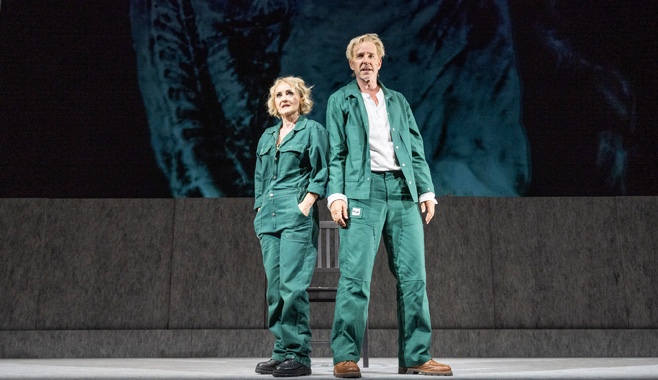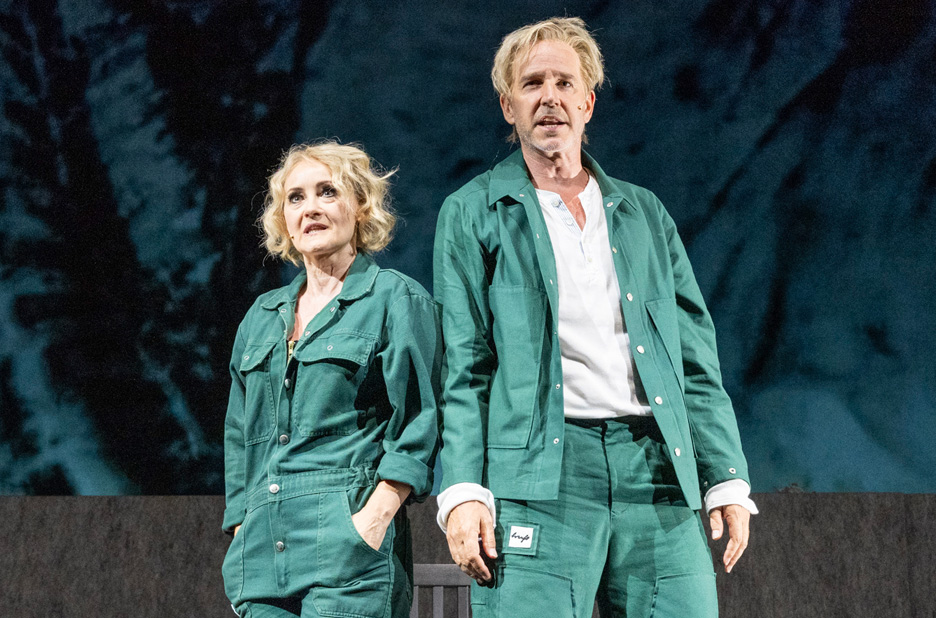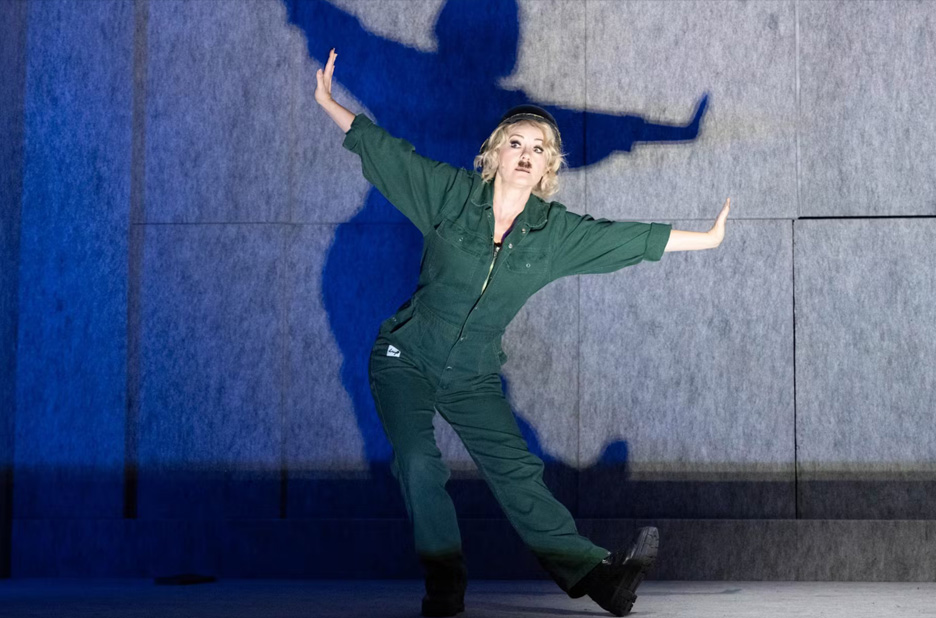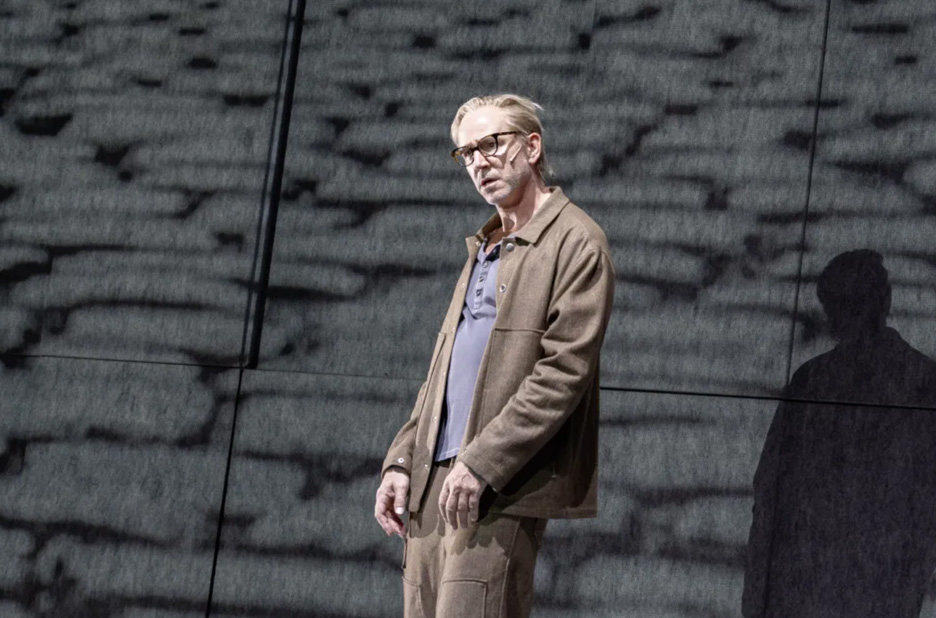Theatre
Stranger than the moon
The Coronet Theatre, London
5/5
Pure. Objective. Evil.
The Berliner ensemble, on a rare visit to London, reminds us of Brecht’s greatness and humanity, and of the beauty of hearing his texts in German. Stranger than the moon (Fremder als der Mond) is an autobiographical play about Bertold Becht made up of his various texts: songs, poems, autobiographical notes and letters. Devised for the Berliner ensemble by Adam Benzwi, Oliver Reese (who also directs) and Lucien Strauch, this complex rhapsodic piece distils the essence of Brecht the writer and gives us along the way some morsels about his life emmeshed in his creations.


The cast is superb: Paul Herwig and Katherine Mehrling impress as both actors and singers, complementing each other beautifully, although their core skills have a different emphasis, Herwig above all a mesmerising sophisticated actor and Merhling a stunning and effortless cabaret singer with a huge voice. One of the authors of the piece, Adam Benzwi, also tirelessly provides live piano accompaniment with a great sense of timing, mood and pace. It’s worth pointing out that the Berliner Ensemble is the theatre company originally established by Brecht and his wife in 1949 and still going strong, now under the artistic direction of Oliver Reese, who also directed this play.
Songs are a crucial part of most Brecht’s plays and here too the evening alternates between speech and song. Brecht’s songs are never about pure enjoyment and always carry a sting. Music allows him to position the banal and the meaningful side-by-side in a tight claustrophobic embrace, a structure that provides an apt metaphor for life. The sound of German verses delivered with precise diction was at times spine-tingling. Most of the music was by the Hanns Eisler, one of Brecht’s regular collaborators. Nevertheless one of the highlights of the evening, ‘Ballade of the Soldier’s Wife’, exquisitely performed by Merhling was composed by Kurt Weill. We are talking about a Nazi soldier’s wife who gets gifts from her husband from the different countries he is invading. A few songs like this one were performed in English which gave the non-German speaking members of the audience like me a bit of a respite from checking out the surtitles on the side of the stage and instead allowed them to fully concentrate on the performance.

Brecht’s poems are a revelation to me, his voice the same as in his plays, but with his personality intruding and a greater concentration of meaning. They are mostly about suffering and occasionally about joyful moments, some of them tell a story, others are lyrical and in the moment. Among the most devastating were ‘Falada, Falada, there thou art hanging!’ about a horse who hungry people rip apart for meat as he is dying, told entirely from the horse’s perspective. Also ‘Children’s crusade’ about orphaned children in Poland in 1939 and their dismal deaths. Both are masterfully acted by Herwig who keeps our attention through these powerful texts with great sensitivity and creativity.
There are many other autobiographical snippets about Brecht’s origins, his houses, habits, creature comforts and exile. Some of the most poignant offer compact and brutal self-assessment. The falsely self-pitying and rueful ‘Of poor B.B.’ starts with:
I, Bertolt Brecht, came out of the black forests.
My mother moved me into the cities as I lay-
Inside her body. And the coldness of the forests
Will be inside me till my dying day.
In the asphalt city I’m at home. From the very start
Provided with every last sacrament:
With newspapers. And tobacco. And brandy
To the end mistrustful, lazy and content.

The play is a little long in its intensity for someone who doesn’t necessarily know all the Brechtian references, but it is exciting nevertheless to be enveloped in this different world and get a better understanding of Brechtian poetics.
Another discovery of the evening was the Coronet Theatre. This beautiful intimate Victorian theatre in Notting Hill was restored in 2015 and is establishing itself with some very interesting and audacious international programming. Despite a very rich theatre scene in London, I believe there is a distinct shortage of high-quality non-English-speaking European and international productions and Coronet seems to have found a great niche therein. I hope it continues to bring us interesting productions and invites the Berliner Ensemble back again. I just wish they would turn the heating on, we all had to keep our coats on throughout the evening.
We don’t really find out about Brecht’s life in this play, instead we are immersed in the world of his words which are always poetic and multi-layered, even when cruel. Because life is cruel and people are cruel, and Brecht knew this well. Having lived through the dark Hitler years, the years when the ‘house-painter’ as he called him came to power, he saw people at their worst and was completely ruthless in facing reality and giving a perfect mirror to Germany. He said that he wanted his gravestone to read ‘Pure. Objective. Evil.’, but in the end settled for just ‘Brecht’. In the last verse of ‘To those born later’, he says:
But you, when the time comes at last
And man is a helper to man
Think of us
With forbearance.